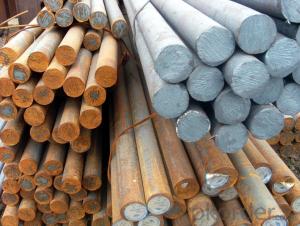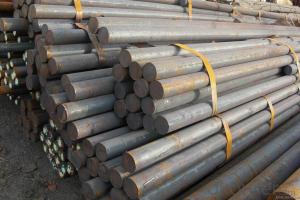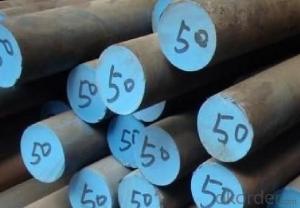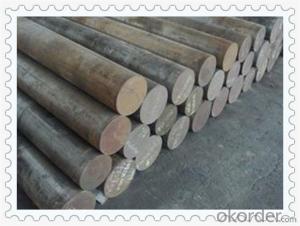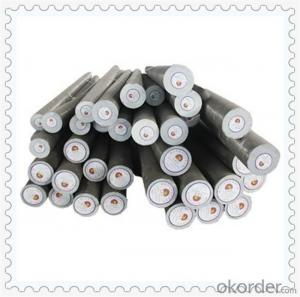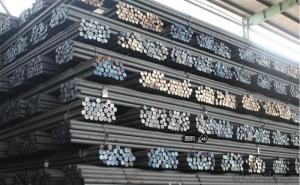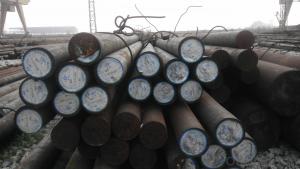SCM440 Alloy Steel Bar Hot-Rolled Bar
- Loading Port:
- Tianjin
- Payment Terms:
- TT OR LC
- Min Order Qty:
- 25 m.t.
- Supply Capability:
- 500000 m.t./month
OKorder Service Pledge
OKorder Financial Service
You Might Also Like
Specification
SCM440 Alloy Steel Bar Hot-Rolled Bar
Product Description:
1. Commodity: Round steel bar
3. Technical: Hot rolling
2. Length: Min. 5.8meter, according to requirement.
3. Diameter: 16mm-250mm
5. Packing: In Bundle or according to your requirements.
4. Standard: GB/T 3077-1999(42CrMo) ; JIS SCM440; DIN 42CrMo4 ; ASTM 4140 ; BS 708M40
Chemical Composition(%):
C | Si | Mn | Cr | Mo | Ni | P | S |
0.38-0.45 | 0.17-0.37 | 0.50-0.80 | 0.90-1.20 | 0.15-0.25 | ≤0.030 | ≤0.030 | ≤0.030 |
Standard:
GB | AISI | DIN | JIS | ISO |
42CrMo | 4140 | 42CrMo4 | SCM440 | 42CrMo4 |
Available Size:
Rolled round bar | φ20-120mm × L |
Forged round bar | φ130-195mm × L |
Application:used for various large-size or medium-size precision plastic mould and low melting
point alloy parts
The steel with high strength and toughness, hardenability is better also | |||||||
After conditioning treatment quenching deformation of small | |||||||
high fatigue limit and repeated impact resistance |
Quality Certificate:we can supply quality certificate
Packaging:standard seaworthy packing or as customer require
Delivery: In 7-10 days after we receive 30% deposite
Product show:
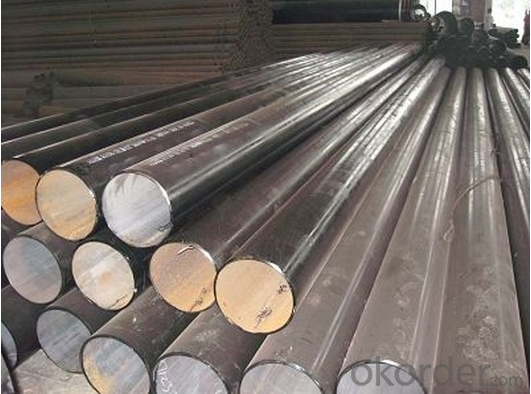
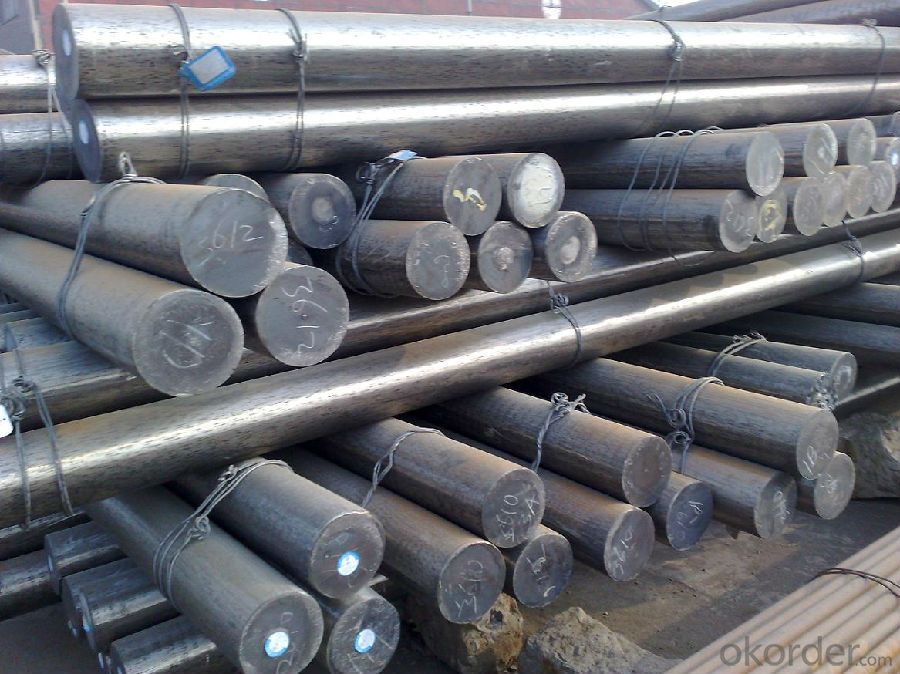
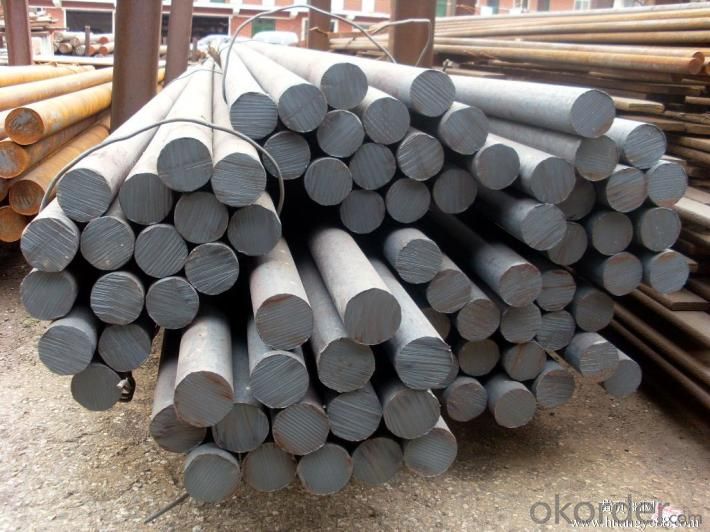
- Q: What are the main applications of special steel in the defense electronics?
- Special steel is used in defense electronics for a variety of applications. It is primarily utilized in the manufacturing of critical components such as casings, connectors, and circuit boards due to its exceptional strength, durability, and resistance to corrosion. Special steel's high magnetic permeability also makes it suitable for electromagnetic shielding, which is crucial in protecting electronic devices from external interference. Moreover, its heat resistance and ability to withstand extreme temperatures enable it to be used in electronic systems that operate in harsh environments. Overall, special steel plays a vital role in enhancing the reliability and performance of defense electronics.
- Q: What are the requirements for special steel used in construction equipment manufacturing?
- The requirements for manufacturing construction equipment using special steel are strict and specific. Below are some important requirements: 1. Strong: Special steel used in construction equipment manufacturing must have high tensile and yield strength to withstand heavy loads and stresses. This ensures the durability and longevity of the equipment. 2. Toughness: The steel should have excellent toughness to resist fractures and deformations caused by impacts or dynamic loading. This is crucial for construction equipment operating in challenging environments. 3. Resistance to wear: Construction equipment is exposed to abrasive forces such as digging, scraping, and crushing. Therefore, the special steel should have high wear resistance to prevent premature wear and failure. 4. Protection against corrosion: Construction equipment often operates in harsh environments like construction sites, mines, and marine applications. The steel should have good corrosion resistance to prevent rusting and corrosion, which can weaken the equipment's structure. 5. Weldability: Construction equipment manufacturing involves various fabrication processes, including welding. The special steel should be easily weldable to ensure proper joining and structural integrity without compromising strength. 6. Heat resistance: In certain construction applications, equipment may be exposed to high temperatures or thermal cycling. Special steel should have good heat resistance to maintain its mechanical properties and structural stability under these conditions. 7. Ability to be shaped: Construction equipment often has complex shapes and structures. The steel should be easily formable to allow for easy shaping and fabrication of the desired components without compromising its mechanical properties. 8. Cost-effective: While meeting the above requirements, special steel used in construction equipment manufacturing should also be economically feasible. This means balancing the desired properties with the cost of production and procurement. By meeting these requirements, the special steel used in construction equipment manufacturing can withstand demanding conditions, provide long-term durability, and ensure the safety and efficiency of the equipment. Additionally, compliance with industry standards and regulations is crucial to guarantee the quality and reliability of the steel used in construction equipment manufacturing.
- Q: What are the different cutting tools used for special steel?
- There are several different cutting tools that are commonly used for special steel applications. These tools are specifically designed to handle the unique properties and characteristics of special steel, which often requires more precise and specialized cutting techniques. Some of the most commonly used cutting tools for special steel include: 1. Carbide tipped saw blades: These saw blades have carbide teeth, which are extremely hard and durable. They can cut through special steel with ease, providing clean and accurate cuts. 2. High-speed steel (HSS) cutting tools: HSS cutting tools are made from a type of tool steel that can withstand high temperatures and maintain their hardness. These tools are commonly used for drilling, milling, and turning operations on special steel. 3. Diamond cutting tools: Diamond is one of the hardest materials known to man, making it ideal for cutting through tough materials like special steel. Diamond cutting tools, such as diamond-coated saw blades or grinding wheels, are commonly used in special steel applications. 4. Waterjet cutting machines: Waterjet cutting machines use a high-pressure stream of water mixed with abrasive particles to cut through special steel. This method is particularly suitable for complex shapes and intricate designs. 5. Plasma cutting machines: Plasma cutting machines use a high-velocity jet of ionized gas to cut through special steel. This method is often used for cutting thick sections of special steel quickly and efficiently. 6. Laser cutting machines: Laser cutting machines use a highly focused laser beam to cut through special steel. This method offers high precision and can be used to cut complex shapes and patterns. It is important to choose the appropriate cutting tool based on the specific requirements of the special steel being worked with, as well as the desired cutting method and application. Consulting with a specialist or referring to the manufacturer's recommendations can help ensure the best cutting tool is selected for the job.
- Q: What are the properties of magnetic stainless steel?
- Magnetic stainless steel possesses the unique property of being attracted to magnets due to its high iron content. It is also corrosion resistant, making it suitable for various applications in industries such as construction, automotive, and kitchenware. Additionally, it retains its strength and durability even in extreme temperatures, making it a versatile material for different environments.
- Q: What are the different magnetic grades of special steel?
- Various applications commonly utilize different magnetic grades of special steel. Some well-known magnetic grades include: 1. Soft Magnetic Materials: These special steel grades possess high magnetic permeability and low coercivity. They are ideal for applications requiring strong magnetic induction, such as transformers, electric motors, and magnetic cores for electrical devices. 2. Martensitic Stainless Steels: In their hardened state, these special steel grades exhibit a high magnetic permeability. They are commonly employed in cutlery, tools, and specific automotive components. 3. Ferritic Stainless Steels: Although their magnetic permeability is lower compared to martensitic stainless steels, these special steel grades are still magnetic. They find application in automotive exhaust systems, decorative trim, and appliances. 4. Duplex Stainless Steels: These special steel grades have a mixed microstructure of austenite and ferrite, resulting in a magnetic response. They are renowned for their exceptional corrosion resistance and are utilized in chemical processing equipment and offshore oil and gas platforms, where both strength and corrosion resistance are crucial. 5. Austenitic Stainless Steels: In their annealed state, these special steel grades are non-magnetic. However, slight magnetism can be observed when they undergo cold working or contain specific alloying elements. Austenitic stainless steels are widely used in food processing equipment, architectural structures, and medical devices. It is important to remember that the presence or absence of magnetism in special steel grades can vary depending on factors such as composition, heat treatment, and processing. Therefore, it is essential to consider the specific requirements of an application when selecting the appropriate magnetic grade of special steel.
- Q: What are the properties of spring steel?
- Spring steel is a type of high-carbon steel known for its exceptional elasticity and resilience. It possesses unique properties such as high yield strength, excellent fatigue resistance, and the ability to return to its original shape after being bent or twisted. This type of steel also exhibits good corrosion resistance, high tensile strength, and durability. Due to its properties, spring steel is widely used in various applications including springs, suspension systems, blades, tools, and automotive components.
- Q: What are the different types of high-strength steel?
- There are several different types of high-strength steel, including high-strength low-alloy (HSLA) steel, advanced high-strength steel (AHSS), ultra-high-strength steel (UHSS), and maraging steel.
- Q: What are the applications of tool steel?
- Tool steel has a wide range of applications due to its high hardness, resistance to wear, and ability to retain sharp edges. It is commonly used in the manufacturing of cutting tools, dies, molds, and machine components that require high strength and durability. Additionally, tool steel finds its use in the automotive, aerospace, and construction industries, where its properties are crucial for efficient and precise operations.
- Q: What are the different surface treatments used for special steel?
- There are several different surface treatments that can be used for special steel, depending on the specific requirements and desired properties. Some of the commonly used surface treatments for special steel include: 1. Nitriding: This process involves diffusing nitrogen into the surface of the steel, resulting in a hardened layer. Nitriding improves the surface hardness, wear resistance, and fatigue strength of the steel. 2. Carburizing: Carburizing involves introducing carbon into the surface of the steel, forming a hard and wear-resistant layer. This process enhances the surface hardness and improves the steel's resistance to wear and fatigue. 3. Coating: Coating is a popular surface treatment technique where a thin layer of protective material is applied to the steel surface. Coatings can include various materials like zinc, chrome, or ceramic, which provide corrosion resistance, improved aesthetics, and enhanced durability. 4. Shot peening: Shot peening is a mechanical surface treatment technique that involves bombarding the steel surface with small metallic or ceramic particles. This process induces compressive stresses in the material, enhancing its fatigue strength and resistance to cracking. 5. Electroplating: Electroplating is a process where a thin layer of metal is deposited onto the steel surface using an electrical current. This treatment provides improved corrosion resistance and can also enhance the appearance of the steel. 6. Passivation: Passivation involves treating the steel surface with a chemical solution to remove impurities and create a protective oxide layer. This process improves the corrosion resistance and enhances the surface finish of the steel. 7. Anodizing: Anodizing is a surface treatment commonly used for aluminum but can also be applied to special steel. It involves creating an oxide layer on the steel surface through an electrolytic process. Anodizing improves corrosion resistance, provides an aesthetic finish, and can also be used for coloring the steel. These different surface treatments offer various benefits and are chosen based on the specific application requirements, such as corrosion resistance, wear resistance, hardness, aesthetics, or improved mechanical properties.
- Q: Are there any disadvantages of using special steel?
- Yes, there are some disadvantages of using special steel. Firstly, special steel is generally more expensive than regular steel. The production process of special steel involves additional alloying elements and heat treatments, which contribute to the higher cost. This can make it less economical for certain applications where cost is a major consideration. Secondly, special steel may have limited availability compared to regular steel. Special steel grades are often produced in smaller quantities and may only be available from specific suppliers. This can lead to longer lead times and difficulties in sourcing the required quantity of special steel, especially for large-scale projects. Additionally, the increased complexity of special steel can make it more difficult to work with. Special steel may require specialized knowledge, skill, and equipment to handle and process. This can lead to higher manufacturing costs and potential production delays if the necessary expertise or resources are not readily available. Furthermore, the high strength and hardness of some special steel grades can make them more prone to brittleness. This means that special steel may be more susceptible to cracking or breaking under certain conditions, especially when subjected to extreme temperatures or sudden impact loads. This can be a drawback in applications that require high toughness or resistance to fracture. Lastly, special steel may have limited applications due to its specific properties. While it offers enhanced characteristics such as corrosion resistance, high temperature resistance, or improved mechanical properties, these advantages may not be relevant or necessary for every application. In such cases, using special steel may be an unnecessary expense without any tangible benefits. In conclusion, special steel has its drawbacks, including higher costs, limited availability, increased complexity, potential brittleness, and limited applicability. Therefore, careful consideration should be given to the specific requirements of the project before opting for special steel.
Send your message to us
SCM440 Alloy Steel Bar Hot-Rolled Bar
- Loading Port:
- Tianjin
- Payment Terms:
- TT OR LC
- Min Order Qty:
- 25 m.t.
- Supply Capability:
- 500000 m.t./month
OKorder Service Pledge
OKorder Financial Service
Similar products
Hot products
Hot Searches
Related keywords








